One thing you shouldn't go car camping without, plus 24 other essentials

Yes, Labor Day is around the corner, but that doesn’t mean camping season has to end. The cooler temperatures and longer nights may mean school is starting back up, but for those of us who don’t have kids it means fewer crowds at campgrounds and hiking trails. Cooler temperatures also mean animals tend to be more active, so if wildlife encounters are what you’re after, there’s no better time than fall. So dust off that heavy sleeping bag and hit the road. But before you do, make sure you have the essentials listed below.
BioLite Charge PD
The BioLite Charge PD is not only a camping essential, but a life essential. As someone who routinely stores maps and takes photos with their phone (who doesn’t these days), going days without the use of my electronics while camping just isn’t an option. Even the newest of phone batteries won’t last a few days without a charge, which is where the Charge PD comes in. Available in three sizes (20, 40 and 80) this powerbank will get your phone back up and running in no time. The 20 is lightweight and can charge a smartphone fully 1.5 times, the 40 2.5 times, and the 80 will get your phone fully charged 5 times and is generally what I take with me car camping.
My favorite thing about the BioLite Charge PD is that they easily daisy-chain together when charging, allowing you to charge multiple powerbanks at one outlet.
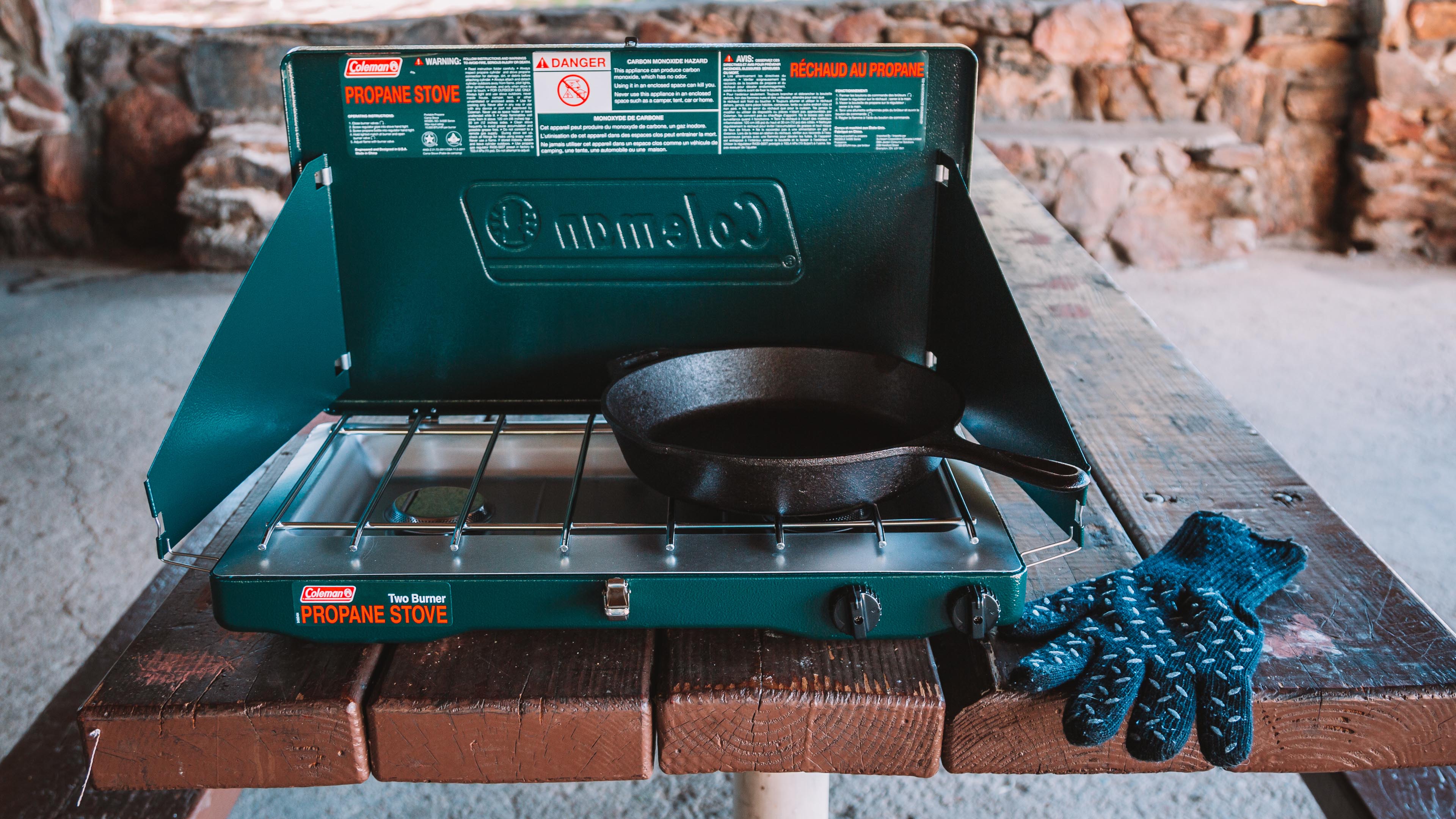
Lodge cast iron skillet
Lodge has been the name in cast iron for years, which is why it can be found in both high-end cookware emporiums like Williams-Sonoma, and at your local Walmart. And unlike your stainless steel cookware at home, a Lodge cast iron skillet is right at home over a campfire. I’ve had everything from breakfast burritos to steak, burgers to an incredibly memorable batch of nachos (thanks, Jeremy) on the Lodge, so when it comes to car camping, this skillet is the first thing I pack.
Pro-tip: If you’ve never used cast iron before, make sure to season it before use. Check out how to care for your cast iron skillet here.
Campfire mitt
Let’s start off vacation right, by not burning our hands so badly that we have to find the nearest backwoods emergency room. This campfire mitt is much cheaper than an ER bill, and it can handle temperatures of up to 932 degrees Fahrenheit.
Coleman stove
While my preferred method of cooking is over an open fire, in some parts of the country, especially during the summer months, open fires aren’t an option. That’s where the classic Coleman stove comes in. This inexpensive option runs on propane and features two adjustable burners and a windscreen, and will heat up whatever you’re cooking quickly. It can fit both a 12-inch and 10-inch pan simultaneously, so you can heat up water for coffee and make breakfast all at once.
Pro-tip: Larger propane canisters will last longer and can be used with this stove, too. All you need is an adapter hose.
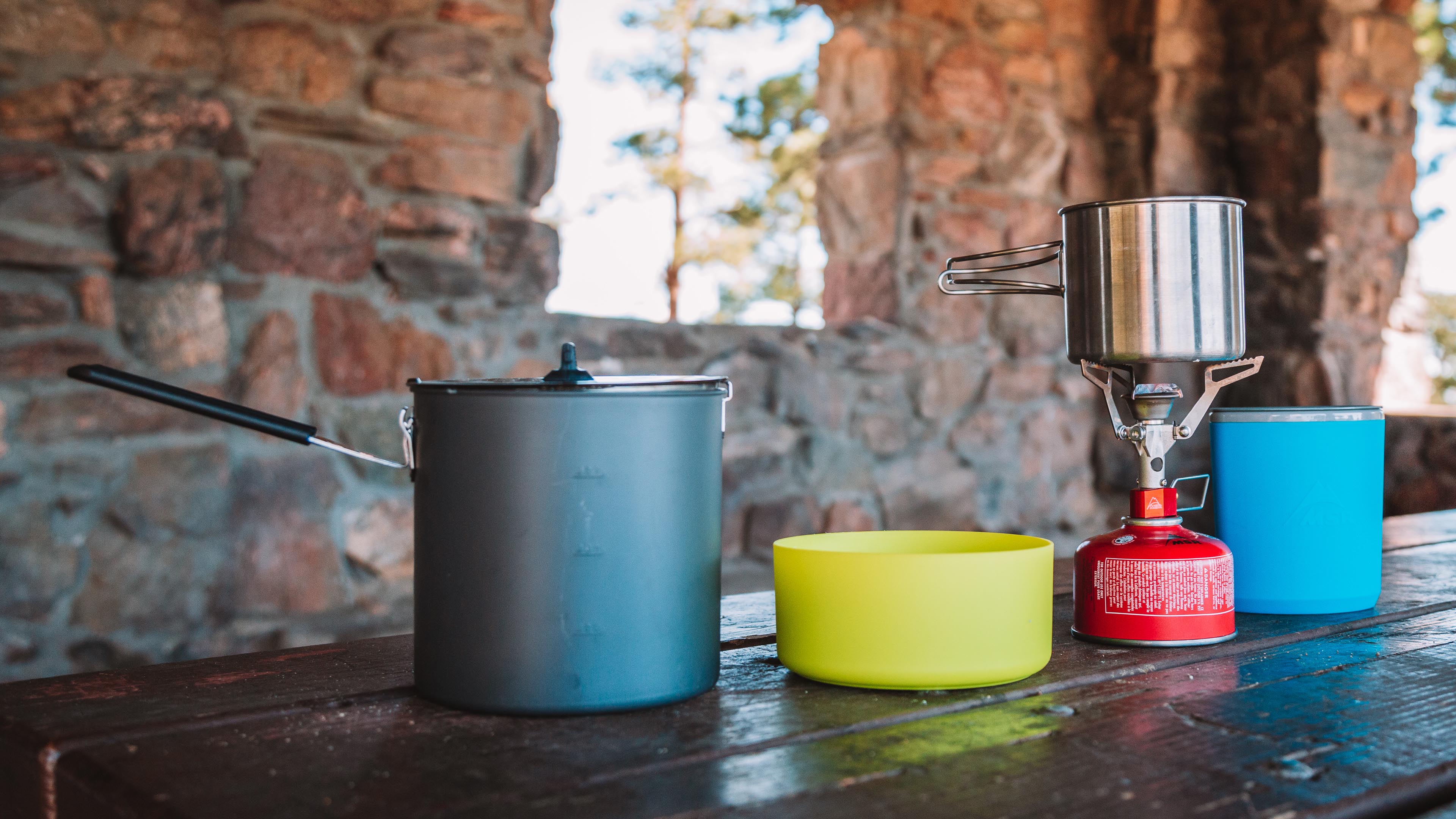
MSR Pocket Rocket stove
If the Coleman stove takes up too much space or you’re planning on going backpacking and would rather not lug a 10-pound stove on your back, the MSR Pocket Rocket 2 is an inexpensive, ultralight option that folds up into the size of a small multitool. Weighing in at only 2.6 ounces (yes, you read that correctly), the pocket rocket screws into the top of any isopro fuel canister and will boil a liter of water in under 4 minutes.
Pro-tip: Wondering how much fuel is left in your canister? Stick it in water. If the canister floats all the way at the top, you’re low on fuel.
MSR and Coleman fuel canisters
You won’t get very far with either stove without fuel. The MSR options are lightweight, while the Coleman option is cheaper. Pro-tip: Some campsites have areas where fellow campers can leave any unused food/fuel for the next group. While I wouldn’t rely on an area like this for all my fuel, it is a great place to pick up a few half-used canisters for free. Make sure to pay it forward at the end of your stay.
Lightweight cookware
While I love the Lodge Cast Iron Skillet, if you’re looking to cook on an ultralight stove, you’re going to want some lighter cookware. This option collapses down, taking up almost no space, and, at 21.5oz is lightweight. It includes a 2.8-liter pot with an aluminum base and silicone side walls, two bowls and two mugs.
Pro-tip: Want washing dishes to be as easy as possible? Rinse these bad boys out immediately after eating.
Freeze-dried food packets
Cooking over an open fire (or stove) is one of the things I like most about camping, but for those who prefer to spend most of their time hiking or hammocking, these meal pouches from Mountain House are surprisingly tasty, and only take a bit of boiling water to make. In fact, when my camper van broke down on the side of the road in Iceland a few years back, a couple of these helped tide our group over until we were picked up 18 hours later.
Pro-tip: When it comes to freeze-dried food, anything that sounds too good to be true most likely is. Stick to simple meals like chicken and rice, beef stroganoff or chili mac, and you’ll have a tasty meal that won’t let you down.
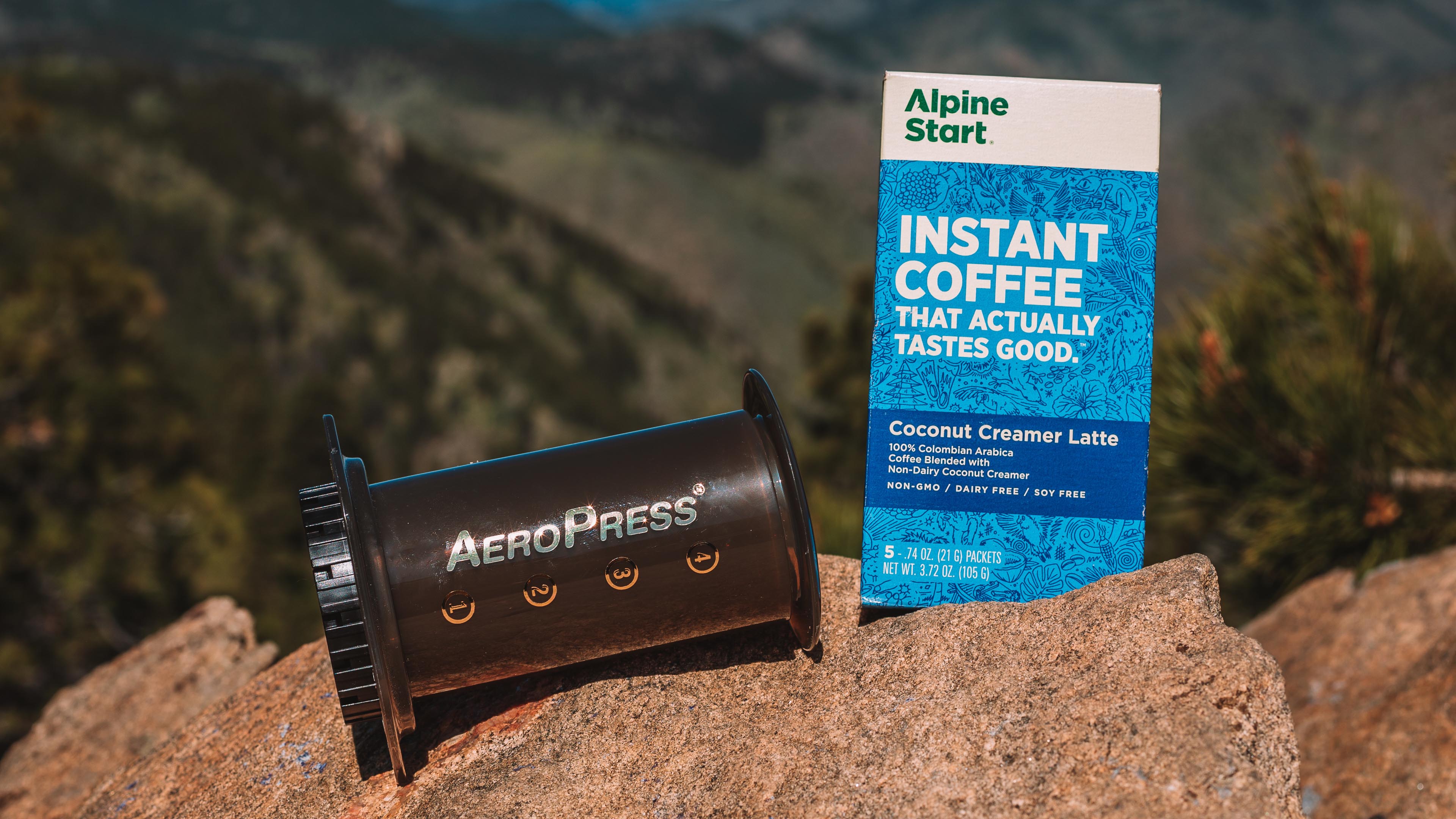
AeroPress
If the line at the coffee machine every morning is any indication, we love ourselves a cup of joe here at Autoblog, and nothing about that changes when camping is involved. In fact, on a brisk early-summer morning, a well-made cup of coffee is about all that can coax me out of my sleeping bag. The AeroPress is compact, easy to use, and makes a damn good cup of coffee. Sometimes I need to double up on filters to prevent seepage, but it’s still much better than instant.
Pro-tip: There are plenty of ways to make coffee. If you want to see how the pros use their AeroPresses in the wild, check out this video.
Instant coffee
I have yet to drink a cup of instant coffee that I actually enjoyed. That being said, any coffee is better than no coffee, so if this is what you have, go for it.
Pro-tip: Don’t drink instant coffee.
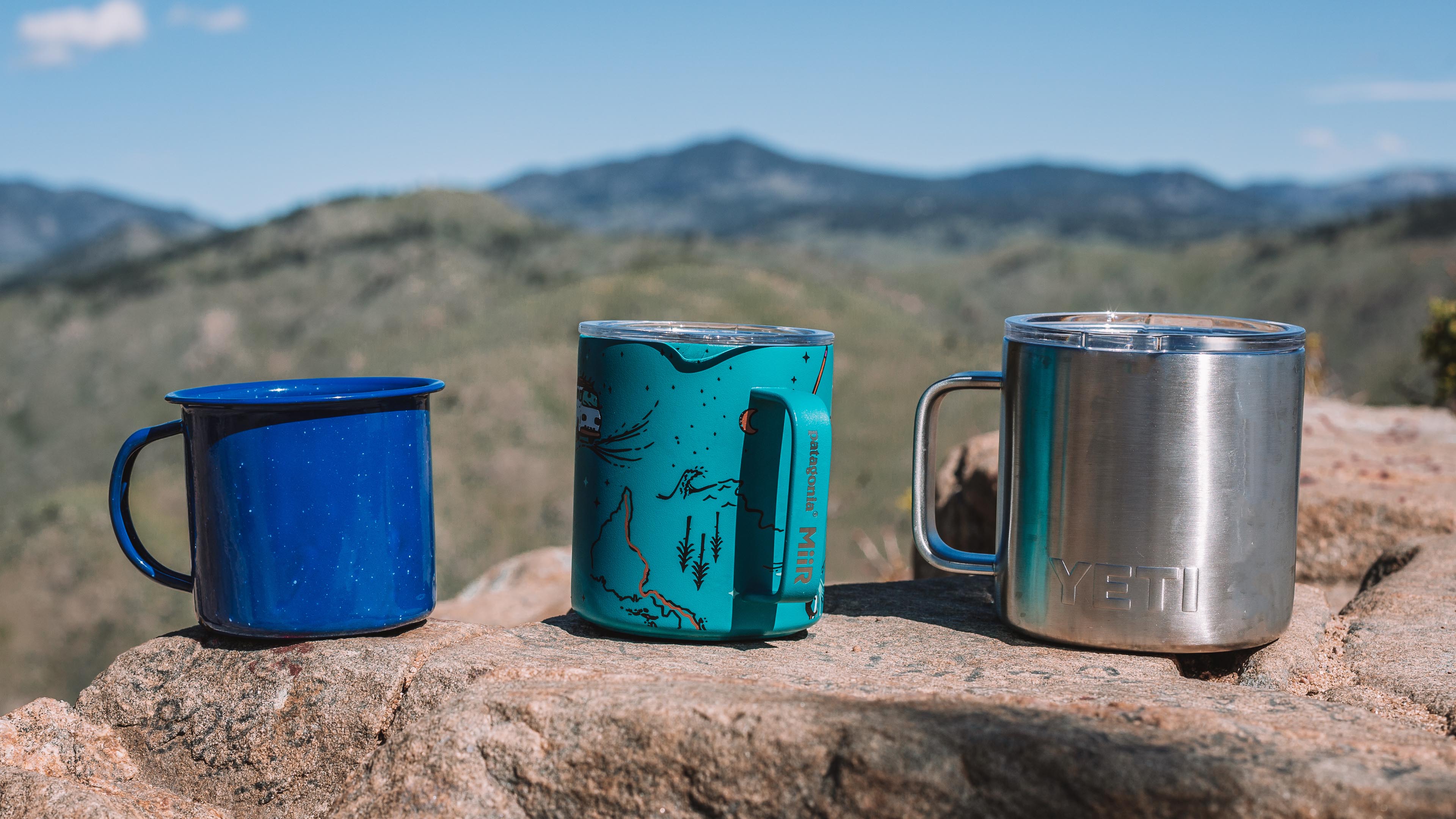
Insulated mugs
The first time I ever used an insulated mug, I made some tea, forgot about it, then burned my tongue drinking it over an hour later. If you want your cup of coffee, hot chocolate or tea to stay hot (or cold), insulated is the way to go. There are plenty of companies that make insulated mugs these days, but my go-to are from Miir and Yeti.
Pro-tip: Insulated mugs work almost too well. I leave the lid off so I can enjoy my coffee sooner, and it still stays pretty hot but won’t burn your tongue.
Coleman camp mugs
Insulated mugs cost money. These mugs are cheap, have a classic look and are lightweight. Just make sure to hold them by the handle.
Pro-tip: Drink your beverage out of these quickly. Whatever hot beverage you have in these will cool down to its surrounding temperature in minutes.
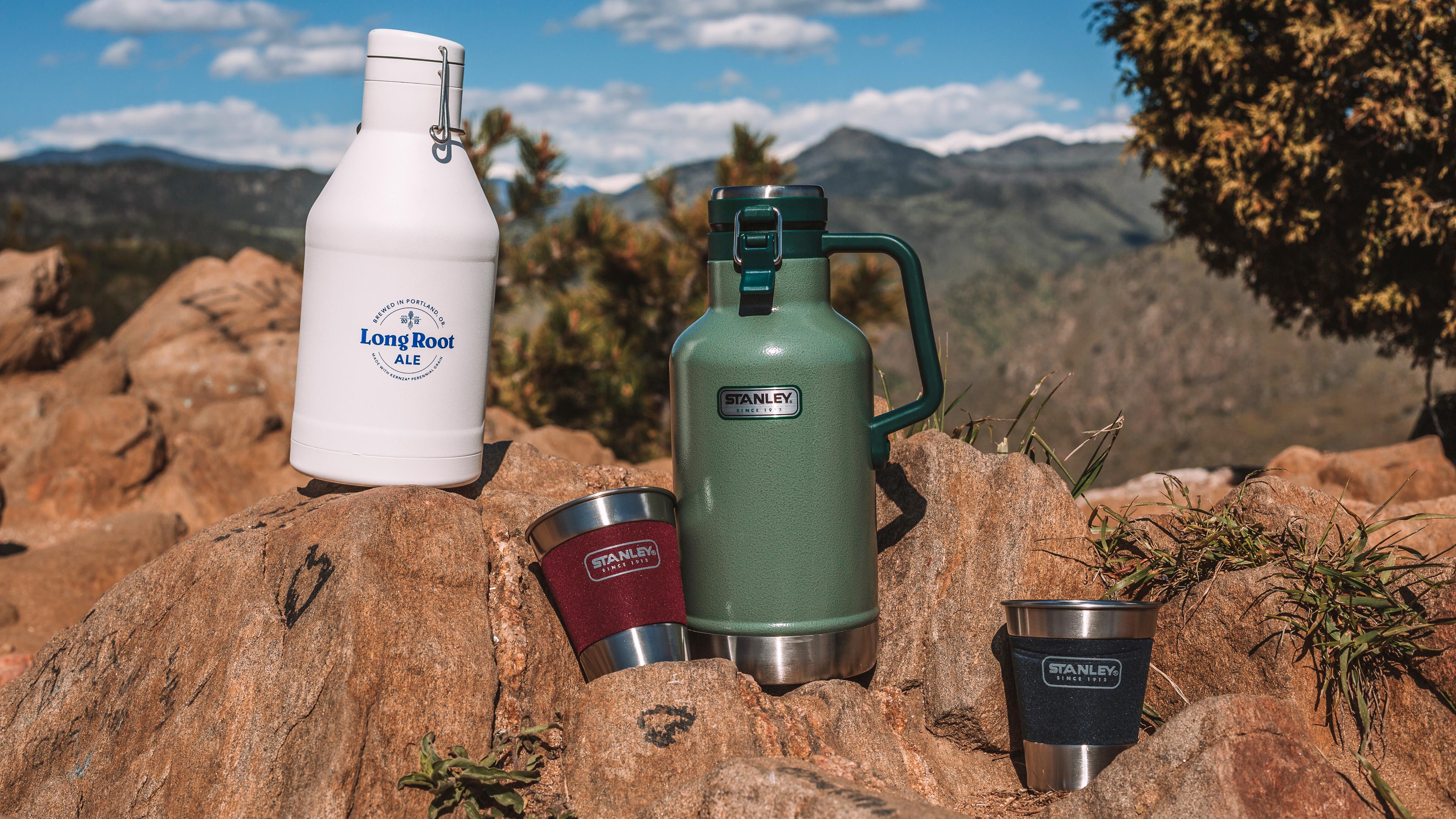
Insulated growlers
First things first, don’t drink and drive and don’t keep a container of alcohol within reach of anyone in your car, parked or not. Keep the growlers in the trunk. There are few things worse than driving a few hours, setting up your campsite, and sitting down to realize that the beer you picked up from the brewery along the way is already at room temperature. That is where insulated growlers come in, and these two are some of the best on the market. The Stanley Growler Set not only comes with a cool, classic green growler, but four cups with koozie sleeves so you can share your beer with your campmates. The Miir growler is vacuum insulated and at $30 is a great way to keep your beverages just the way you like them. Both of these growlers will keep coffee hot for hours and hours, and beer cold and carbonated for over a day, which should be plenty of time to finish off the contents.
Pro-tip: The Stanley Growler is dishwasher safe, while the Miir is hand wash only.
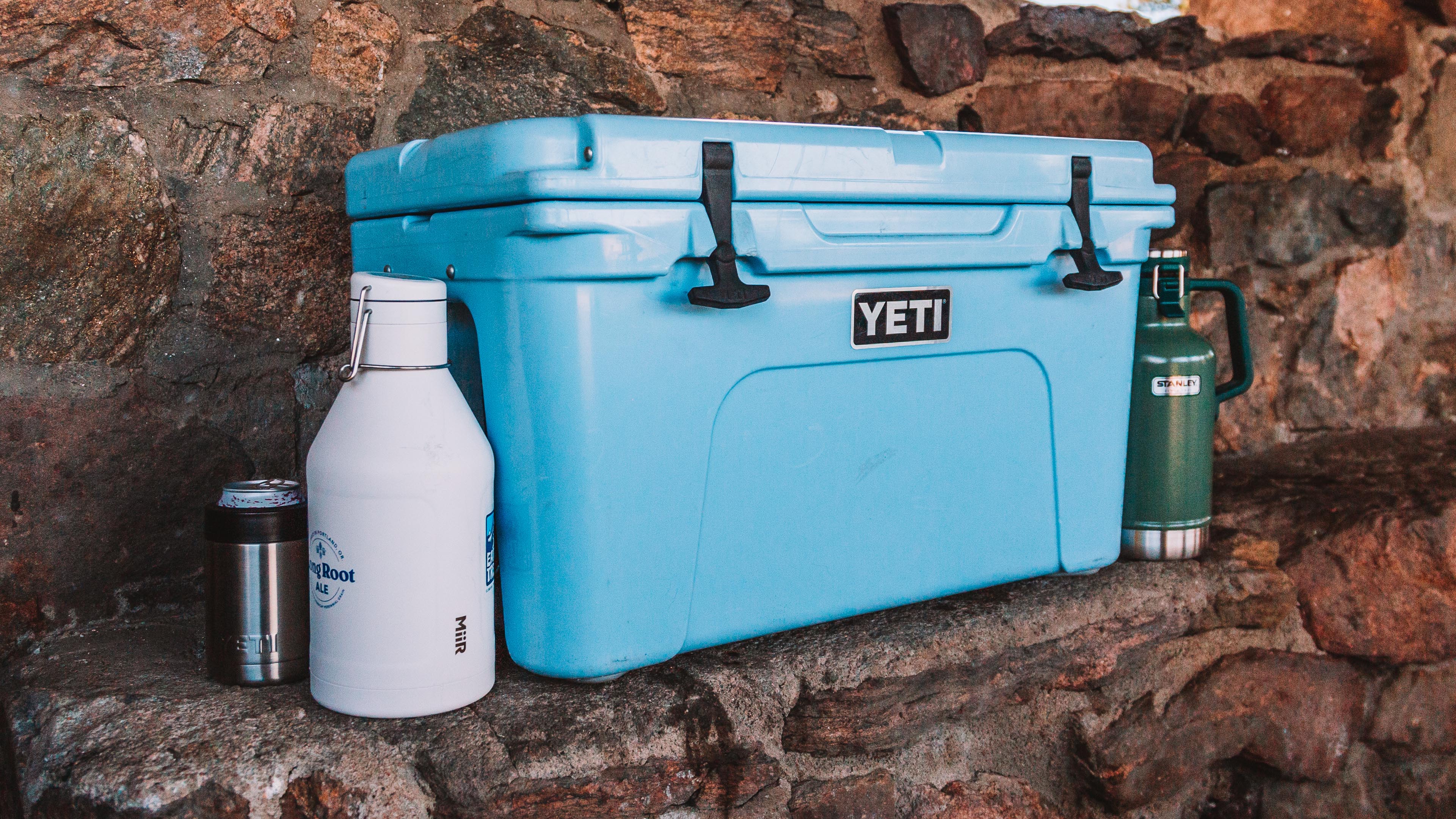
Yeti (or RTIC) can koozie
A few years ago, I was traveling to northern Michigan with Production Manager Eddie Sabatini for a relaxing Memorial Day weekend. We went out on the lake for some fishing, and I realized I had left my beer on the dock, sitting in the hot sun. Two hours later when we came back in, my beer was still cold, thanks to my insulated can koozie. Sure they don’t fit every size can or bottle (I’m looking at you, Coors Banquet stubbies), but they keep your drink as cold as when you pulled it out of the fridge, at least for a few hours.
Pro-tip: If you prefer slim cans (think Red Bull or Stella Artois), order one with a slim gasket.
Yeti cooler
I once read that Yeti coolers are the most stolen items in America, and while I’m not sure if that is true, I wouldn’t have a hard time believing it, because the Yeti is one of my most-used items in the summer. I’ve flown with it, camped with it, and it has kept drinks and food cold for weeklong trips. It probably would’ve kept the drinks longer, but my trip ended before I could find out. Cool down the cooler a day before using it, by filling it with ice. And while it has kept drinks and food cold for up to a week for me, remember this is a cooler, not a freezer. Ice cream will not stay frozen and will result in a sticky liquid mess.
Pro-tip: Yetis are expensive and, as mentioned before, a target for thieves. If you’re traveling with this in the bed of a truck, like we did on our Tacoma road trip from Seattle to Banff, Alberta, make sure to lock it to the truck with some bike cables.
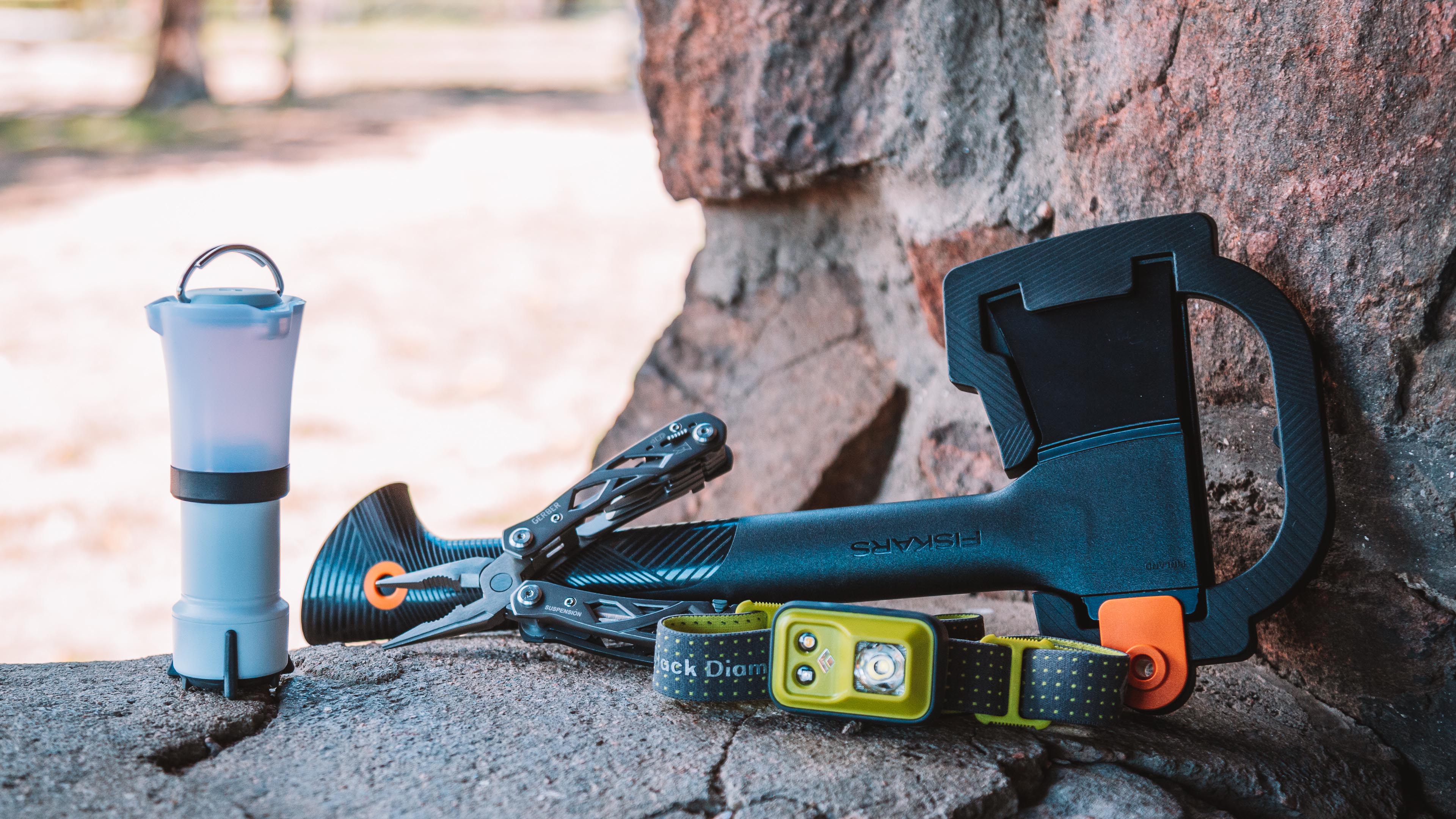
Fiskars 14-inch hatchet with sheath
Unless you carry a box of split wood in your car at all times, chances are you’ll have to split some yourself for a fire. The Fiskars 14″ hatchet is lightweight and razor sharp right from the factory. Is it the best hatchet ever made? No. But for $25 you can’t go wrong. After a while, like any blade, it dulls. Thankfully Fiskars also sells a sharpener.
Pro-tip: Hatchets are for cutting, not hammering. Use it properly and you shouldn’t hurt yourself.
Gerber Suspension multitool
There are a ton of multitools out there. The one I use most is a Gerber. The locking blades, which prevent the knife from closing during use, are the precise reason I bought this model. (My last one closed on my finger, cutting me down to the bone and leaving a nasty scar.) Plus, in addition to a knife and pliers, it features 10 other tools, such as a saw, serrated blade, scissors, screwdrivers and the ever important bottle opener.
Pro-tip: I travel a lot, both in-car and on planes. Don’t forget to remove your multitool from your bag after camping, lest you try to go through airport security with it. At best, you lose your favorite multitool. At worst you miss your flight sitting in a back room explaining to TSA why you were trying to board a plane with a serrated blade.
Headlamp
I was car camping in Glacier National Park a few years ago when I woke up in the middle of the night to use the nearby restroom. I made it 4 feet before smacking my head on a low-hanging tree branch right in front of my face. I’ve brought a headlamp with me ever since. This example from Black Diamond is lightweight, has a strobe, dimming, and red light mode for night time. It can also be submerged. I’ve used it for years and the battery is still going strong.
Pro-tip: If you need a lantern in your tent, attach your headlamp to a gallon jug of water. This jug will light up, illuminating your surroundings.
BioLite Alpenglow Mini 150 Lumen Rechargeable Lantern
Old school Coleman lanterns are great, but they require fuel, are heavy and if you’re not careful, can set your tent on fire. This tiny lantern from BioLite is bright, light, and thanks to the LEDs, stays cool all night long.
Pro-tip: Before buying any kind of lantern, check the rules in your camping area. If they list no fires, use an LED option instead.
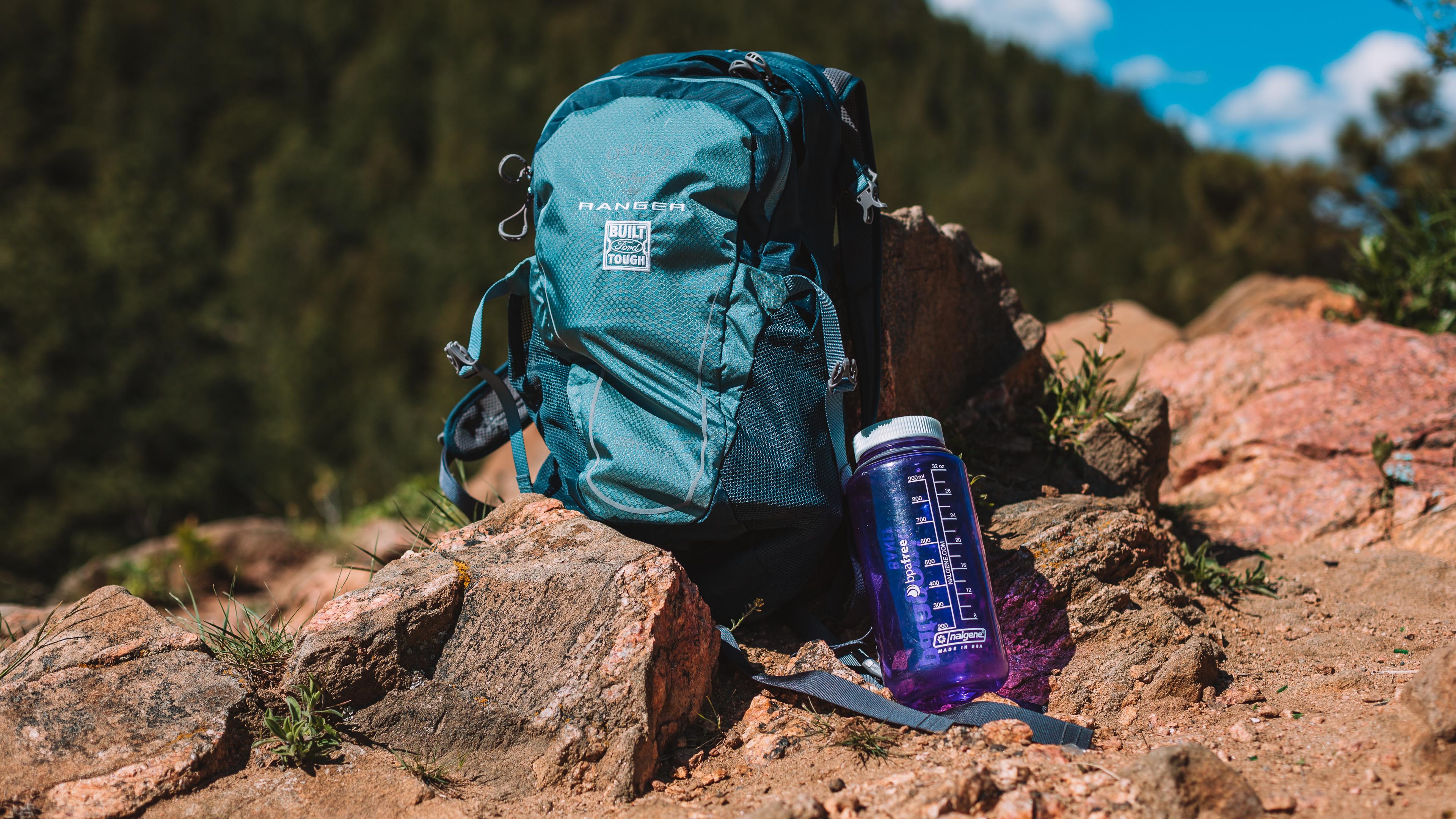
Daypack
Most of the time when I’m car camping, getting to the campsite is the beginning of my travels. It’s a basecamp, a place to sleep and store my stuff while I go out on longer day hikes. That’s where a good daypack comes in. It allows me to bring all of the food and water and gear I’ll need for a 7- to 12-mile hike without having to pack up everything else. Any backpack will do, but this one from Osprey is lightweight and sits nicely on my shoulders.
Pro-tip: You don’t need to bring everything under the sun with you on day hikes, but make sure anything valuable you leave back at camp is locked up.
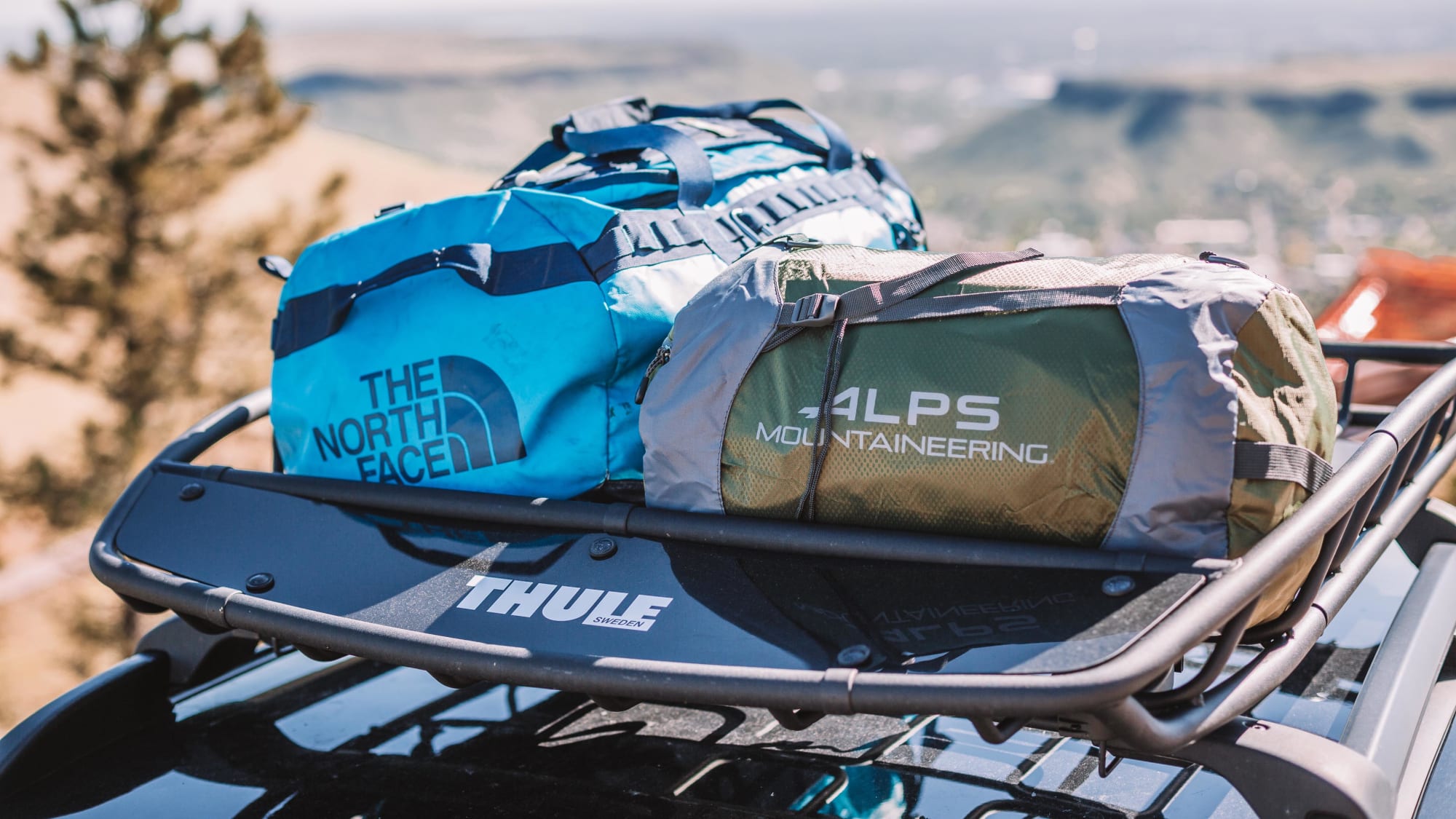
Thule Canyon XT cargo basket
Not everyone has the luxury of driving a vehicle that can hold all the gear you need for a weeklong camping trip and still fit four people comfortably. That’s where a cargo basket like this one from Thule comes in handy. Sure, the added wind noise isn’t great, but the fact that you don’t need to store your luggage on your lap for a 4-hour drive is definitely preferable.
Pro-tip: Instead of buying the $55 bungee cargo net that Thule sells, find a generic one on Amazon. It saves you money without losing any of the function.
The North Face Base Camp duffel
If you’re going to be storing your luggage in a cargo basket, it’ll be open to all of the elements. This is where a weather-resistant or waterproof duffel comes in handy. I’ve used all sizes of The North Face’s Base Camp Duffel; it’s been subject to freezing rain in Iceland, downpours in the Pacific Northwest, snow in the Rocky Mountains of Colorado and the dirt and sand of Australia and New Zealand, and its contents have always arrived just as clean and dry as when the trip started. Your mileage may vary. When not traveling, I store all of my duffels together in the largest one. It keeps things less cluttered and doesn’t take up much space.
Pro-tip: A compression sack like the ALPS one in the photo above will help you get the most out of your space.
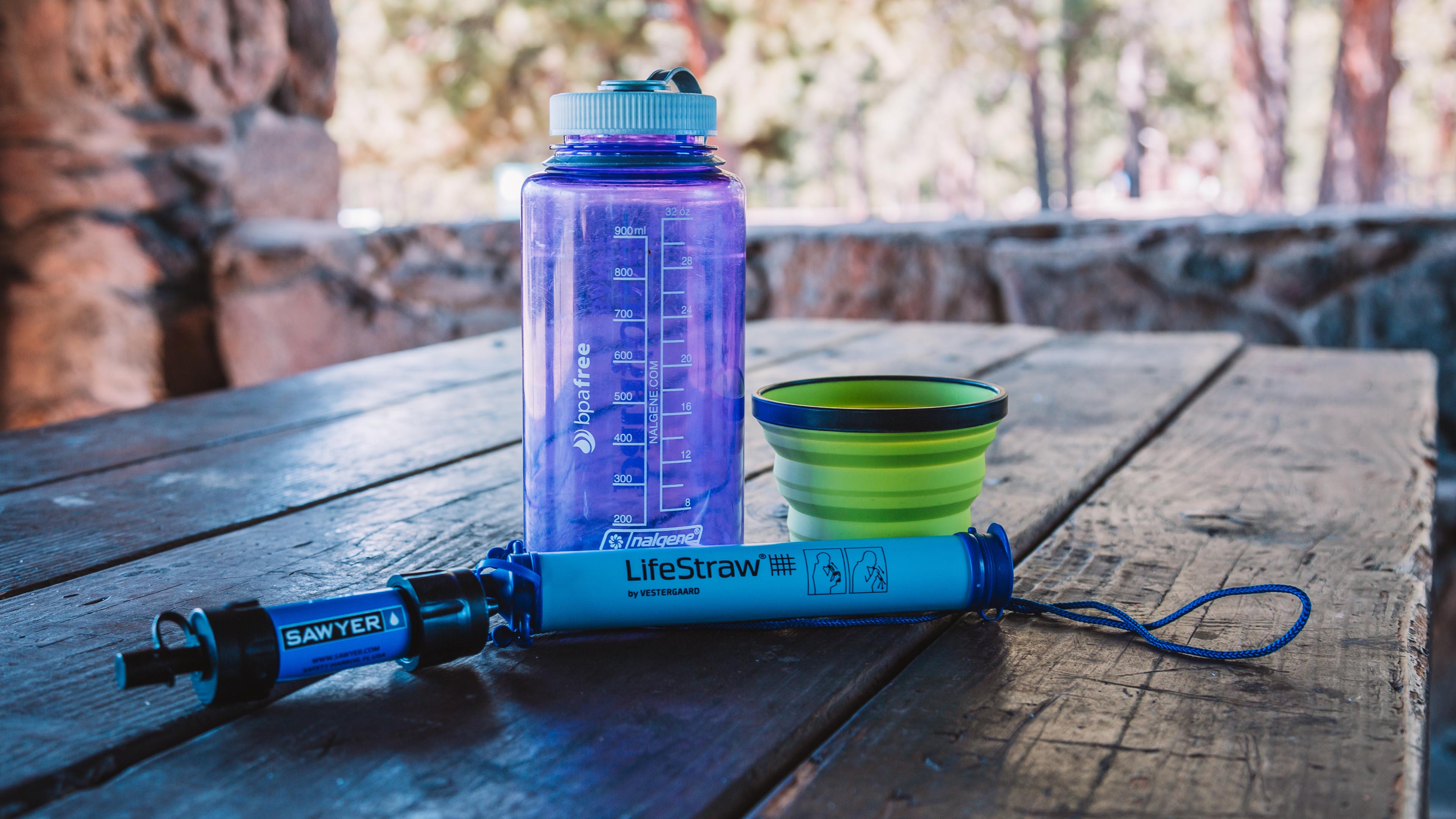
Water purification system
Whether you’re a fan of the Lifestraw or a Sawyer, a water purification system is great to have, lest you forget to bring water along with you. The Lifestraw can be used at the source: Just stick in right in a river or a Nalgene filled with river water, and the straw purifies it while you drink. The Sawyer will screw into a Smart water bottle and can purify the H2O as you squeeze. I have both and use both regularly.
Pro-tip: If you don’t want to bend down into a river with your Lifestraw, fill a Nalgene from the river and use the Lifestraw as you hike along.
Collapsible dog bowl
Sitting in the sun playing fetch all day can be tiresome work, so while you’re emptying the contents of one of the aforementioned growlers, fill up your pup’s bowl so he can stay hydrated.
Pro-tip: Always misplacing your pup’s water bowl? After he’s done drinking, clip it to his collar and you’ll always know where it is.
Nalgene
My go-to water bottle. Usually when hiking I have one filled with iced tea and one with water. Cheap and nearly indestructible.
Pro-tip: Most car campers aren’t ultralight fanatics, but if you are counting grams, a SmartWater bottle fits the Sawyer water purification system nicely and weighs much less.







